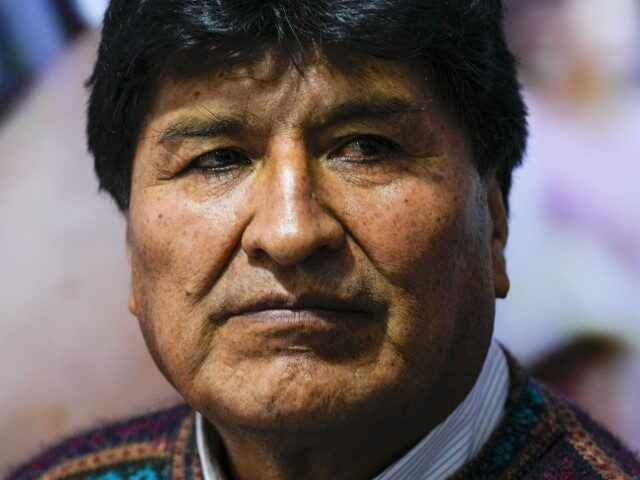Bolivian outlets reported this weekend that the nation’s top court, the Plurinational Constitutional Tribunal (TCP), ruled to uphold the Constitution’s public office term limits, barring socialist former president and suspected pedophile Evo Morales from running a fifth time in the 2025 election.
Bolivia’s Constitution was implemented in 2009 at the end of a process spearheaded by Morales and the ruling Movement Towards Socialism (MAS) party. The constitution’s text explicitly establishes a five-year presidential term duration and that a president or vice president may only be reelected once. Similar term limits are established for members of the Bolivian Congress and other government authorities.
Morales bypassed the two-term limit and ruled Bolivia for four terms from 2006 to 2019, when he voluntarily tendered his resignation. He overrode the constitutional term limits using dubious court proceedings and legal loopholes — including a controversial ruling, which Morales is believed to have forced TCP to issue in 2017, which claimed that term limits represented a “violation” of his human rights.
According to Bolivian newspaper El Deber, TCP’s latest ruling declared that term limits for the legislative, executive, and judicial branches are subject to the rules established by the Constitution and that, as a result, a president may only serve for two terms regardless of whether they are continuous or discontinuous and “without the possibility of extending it to a third term.”
The Bolivian top court reportedly justified its reasoning by stating, “The purpose of the Constituent … is to avoid in any way, the permanence of an elected authority” in power. TCP’s latest ruling also ratified a ruling issued at the end of 2023 that overturned the controversial 2017 ruling, stating that the concept of an indefinite presidential reelection “is not a human right.”
The ruling MAS party is presently split into two factions as a result of a lengthy power struggle between Morales and his former protegé, current socialist President Luis Arce, over control of Bolivia and the party itself, with each side trying to oust the other’s leader from the party’s ranks throughout the year.
Despite the top court’s rulings and Morales having already exceeded the two-term presidential limit, the socialist wannabe dictator and his followers insisted on Sunday that he will run as MAS’s candidate in the 2025 elections. Morales also claimed on Sunday that he and his loyalists intend to march to the capital city of La Paz to demand the government allow him to run next year.
“We are still in a state of emergency, we have only declared a recess, starting on Monday we are going to plan the implementation of the resolutions, including a march to La Paz. I ask for unity and strength from our bases and I assure you that we are going to win this battle,” Morales told his followers.
In addition to insisting on illegally running for president a fifth time, Morales is being investigated on accusations of statutory rape and human trafficking allegedly committed during his presidency.
Local prosecutors found evidence indicating that Morales had a sexual relationship with a 15-year-old girl in 2016, with whom he fathered a child. In October, local police authorities reported Cindy Vargas, the presumptive victim, missing, along with her child. Their whereabouts remain unknown at press time.
To avoid a potential arrest stemming from the probe, Morales bunkered himself in the central region of Cochabamba, his political bastion, where he remains under the protection of his loyalists. Morales also ordered his sympathizers to raise violent blockades across Bolivia’s main roads, leading to widespread shortages and causing $2 billion in losses to Bolivia’s economy, according to President Arce. The blockades, which lasted for 24 days, were lifted last week.
Argentina is also investigating Morales after the nation’s security minister, Patricia Bullrich, accused him of having lived with four minors during his stay in Argentina. Following his voluntary resignation in 2019 amidst widespread protests against his fraudulent “victory” in that year’s elections, Morales briefly lived in Argentina until 2020 after receiving refugee status from the administration of socialist former President Alberto Fernández.
Statements reportedly issued in October by Angélica Ponce, an individual formerly close to Morales, reveal that children allegedly lived with Morales in the house where he stayed in Argentina. According to Ponce, the minors seemed to act as “chiefs of staff” and even “maids,” something that visitors of the socialist former president were allegedly aware of but opted “not to talk about.” President Javier Milei revoked Morales’s refugee status in Argentina.
While Vargas’s case is the only active case Bolivian prosecutors are investigating, El Deber reported on Monday that there are at least 20 other child abuse complaints filed against Evo Morales.
Christian K. Caruzo is a Venezuelan writer and documents life under socialism. You can follow him on Twitter here.

COMMENTS
Please let us know if you're having issues with commenting.